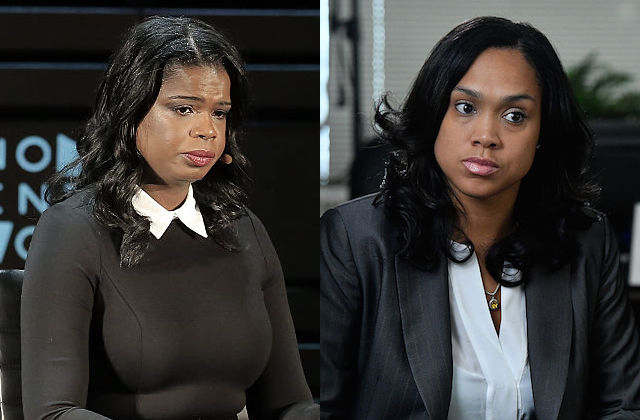From Marilyn Mosby in Baltimore to Kim Foxx in Chicago to Larry Krasner in Philadelphia, people across the nation have voted in district and state’s attorneys with records and rhetoric that suggest they are entrenched in the fight to reform a criminal justice system the disproportionately incarcerates Black and Latinx people. But a November 14 article from The Nation asks if they can have it both ways.
Writer Collier Meyerson begins “Prosecutors Keep Their Jobs by Putting People in Jail. Can They Be leaders in the Fight for Criminal Justice Reform?” with a recounting of Baltimore State’s Attorney Mosby’s attempt to convict the six officers who violently arrested Freddie Gray in 2015, leading to his death in police custody.
She successfully brought six officers to trial, but judges cleared three of charges. After that, Mosby dropped charges against the remaining three. In a July 2016 news conference announcing the dropped charges, Mosby said, “Without real, substantive reforms to the current criminal justice system we could try this case 100 times, and cases just like it, and we would still end up with the same result.” Having an independent agency investigate from the start, and a say over whether the case would proceed before a judge or jury, would have changed the outcome, Mosby suggested. An account of her epic fall from grace in The New York Times Magazine hinted at the biggest challenge for a self-proclaimed progressive state’s attorney, and a Baltimore Sun article put it bluntly: “The [Freddie Gray] case pitted Mosby against police.”
Meyerson goes on to describe the basic conflict at play when prosecutors buck the system:
There is a tension, one that may be unresolvable, between prosecutors who want to make substantive reforms to the criminal justice system—like ending mandatory minimums, overturning wrongful convictions, reforming cash bail, limiting or ending the use of the death penalty and creating diversionary programs for drug offenses—and the reality of the prosecutor’s role within the criminal justice system. It is a conflict of interest to have prosecutors—as civil rights attorney James Meyerson, who’s also my father, wrote for The Huffington Post—tasked with investigating and charging police for crimes committed against citizens. Most of the time, prosecutors, who are simply trying to get convictions, are working with police to bring charges against civilians. Police are the eyes and ears of a prosecutor’s office. Prosecutors rely on police investigators to bring cases against civilians, to show up in court and testify as witnesses, and to extract confessions from suspects. So how can they be expected to go against their own when it comes to charging their friends with police misconduct?
But Meyerson notes that this concern has not stemmed what appears to be a rising tide of reform-minded prosecutors:
Recently, a rash of self-proclaimed progressive prosecutors have made public moves toward reform. There’s Aramis Ayala, who promised not to seek the death penalty in Orlando. Scott Colom, in eastern Mississippi, has stopped prosecuting low-level drug offenses. Kim Foxx, the first Black woman DA in Chicago, promised to create a unit focused on gun trafficking.
And there are more coming. In Philadelphia, longtime civil rights attorney Larry Krasner, who has sued police more than 75 times in his career, is promising to reform harsh sentencing and eradicate money bail. He was elected district attorney on November 8. Geneviéve Jones-Wright, a Black deputy public defender and lifelong native of San Diego, is seeking to beat a Republican district attorney who has been endorsed by the law enforcement community, as well as some establishment Democrats. “I believe the DA’s office needs to be more justice-minded and oriented, rather than being conviction rate-minded,” she told The San Diego Union Tribune.
Some advocates are skeptical. As Josie Duffy Rice of the Fair Punishment Project says in the article, “We’re only now venturing into territory where I would even remotely call a prosecutor progressive, and I’m not even sure if a progressive prosecutor is a possibility anyway.” She continues: “It may not even be a useful term, because the job itself is so fundamentally not progressive. At its most essential, the job is punishment, and given the systemic limitations, there isn’t a prosecutor in America who isn’t locking up too many poor people of color.”
Read the full story over at TheNation.com.
